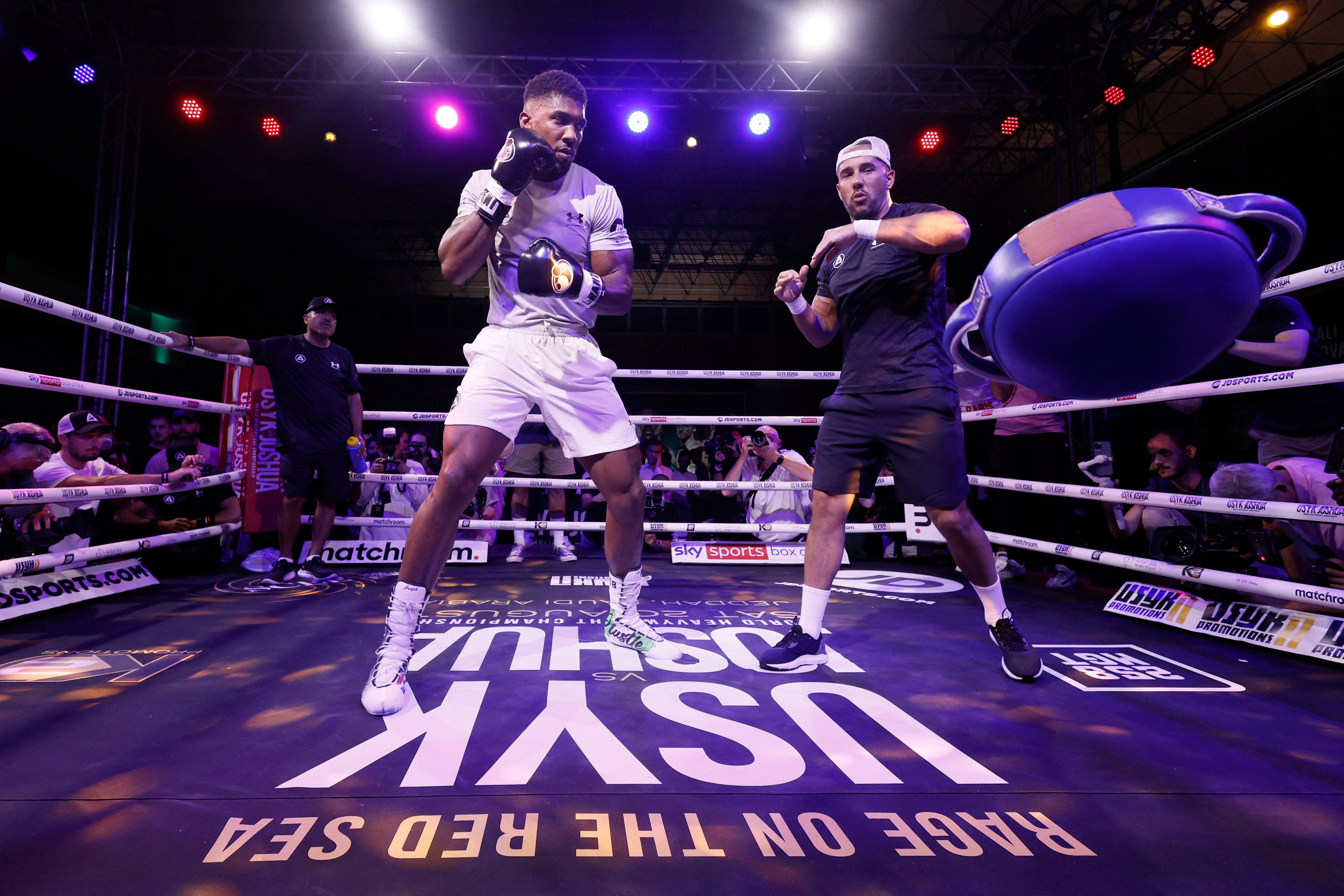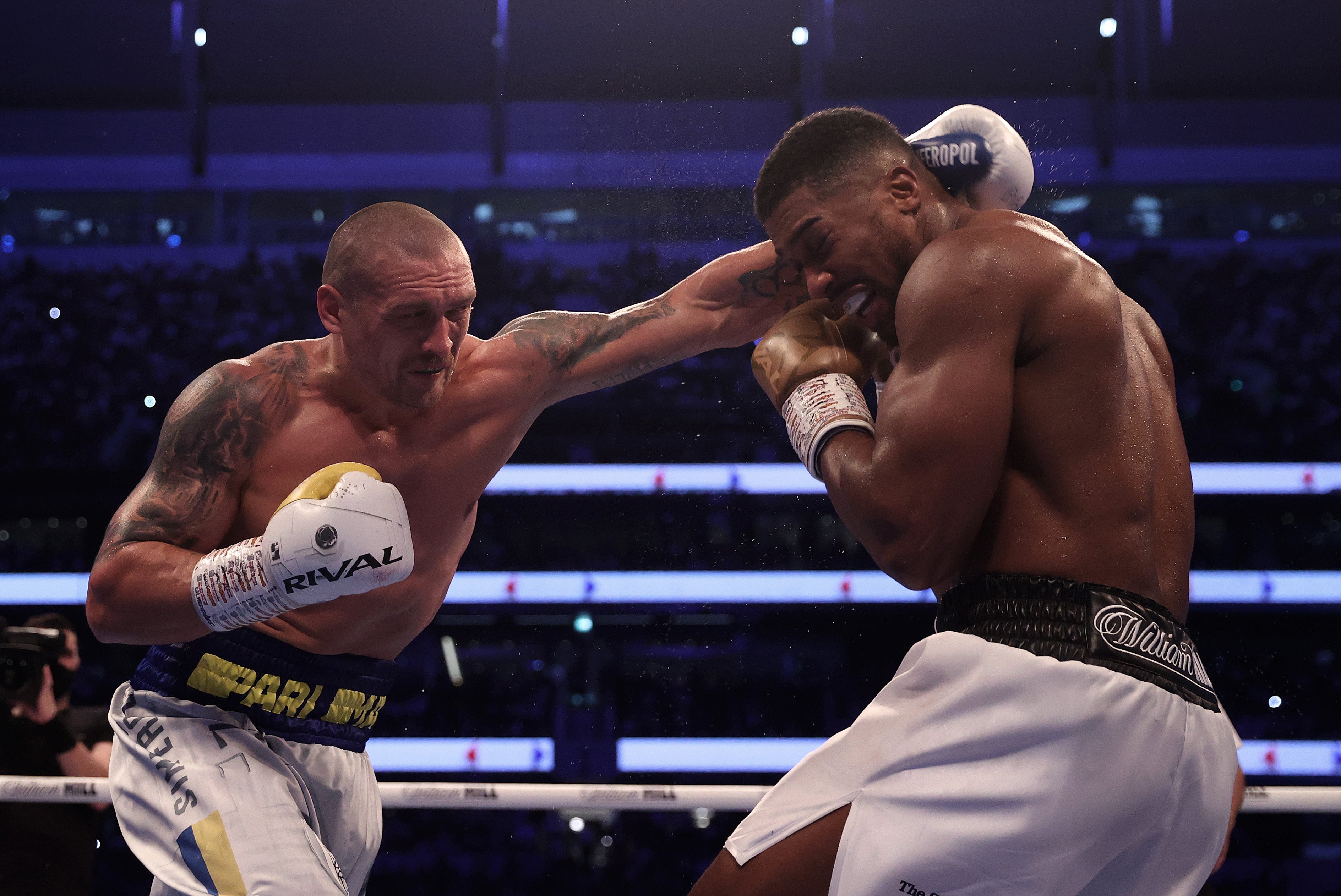Robert Garcia must solve Anthony Joshua’s problems to solve Oleksandr Usyk puzzle
After a long search, Garcia was chosen as Joshua’s new coach and the man to help the Briton avenge last year’s loss to Usyk

Your support helps us to tell the story
From reproductive rights to climate change to Big Tech, The Independent is on the ground when the story is developing. Whether it's investigating the financials of Elon Musk's pro-Trump PAC or producing our latest documentary, 'The A Word', which shines a light on the American women fighting for reproductive rights, we know how important it is to parse out the facts from the messaging.
At such a critical moment in US history, we need reporters on the ground. Your donation allows us to keep sending journalists to speak to both sides of the story.
The Independent is trusted by Americans across the entire political spectrum. And unlike many other quality news outlets, we choose not to lock Americans out of our reporting and analysis with paywalls. We believe quality journalism should be available to everyone, paid for by those who can afford it.
Your support makes all the difference.The weight on Anthony Joshua’s shoulders has never come purely from the hefty world heavyweight titles that were once draped upon them. That subtle ache was always supplemented by the perennial pressure of being Britain’s chosen heavyweight hero.
The feeling should, perhaps, have abated slightly by now – the lifting of those belts from Joshua’s shoulders and onto Oleksandr Usyk’s relieving both the literal and metaphorical weights burdening the Briton.
Instead, Joshua’s decision defeat by the undefeated Ukrainian last September only served to increase the pressure on the beaten champion. When the pair meet in the ring again this Saturday, in the obscure setting of Saudi Arabia’s port city Jeddah, there will be more on the line than the heavyweight titles that Joshua has already lost and regained once in his career. Also at stake will be AJ’s already splintered status as the heavyweight of his generation – a status that, for all of Eddie Hearn’s craftmanship, Tyson Fury has organically begun to scratch at. Furthermore, Joshua’s tenure as a top-tier heavyweight may just be swallowed up once the Rage on the Red Sea has subsided.
So, don’t be surprised if Joshua’s shoulders continue to sag somewhat on Saturday, the pressure still very much present even though the titles will not be ahead of the weekend’s main event. Yet, for once, that pressure may not be unique to Joshua in the Briton’s corner.
Because, by his side – and a slight camera pan down – Robert Garcia will also be feeling the heat in Jeddah.
The selection process for Joshua’s new coach, a process that took the Briton across the pond, generated speculation and intrigue in equal measure. It became arguably the most curious narrative of the build-up to the rematch. Eventually, Garcia became the newest addition to Joshua’s team, the man tasked with reversing the result of last year’s showdown in London and doing what no coach has done: finding a way past Usyk. With Joshua’s long-time trainer Rob McCracken having stepped away from the 32-year-old’s coaching set-up, Angel Fernandez will take on a more prominent role alongside Garcia.

But make no mistake, any credit or blame for the result of Joshua’s rematch with Usyk will be placed on the shoulders (there they are again) of Garcia and Joshua, much more so than on those of Fernandez.
In 2019, when Joshua avenged his June stoppage defeat by Andy Ruiz Jr with a points win over the Mexican-American six months later, McCracken rightly ensured that AJ traded a reckless, knockout-orientated approach for a more measured and disciplined one. The revised game plan paid off, as Joshua jabbed Ruiz Jr to pieces in Riyadh, rather than propelling himself onto Ruiz’s gloves as he had in New York City.
For Garcia, the objective is the opposite. The American must ensure that Joshua avoids any attempt to outbox Usyk. Of course, that is an oversimplification; simply encouraging Joshua to take a more aggressive approach will not solve the Briton’s problems or Usyk’s puzzle. Usyk thrived in the first fight by using his slicker footwork and superior speed to create inventive angles from a southpaw stance and a lower height. The unbeaten Ukrainian also employed incessant feints to make Joshua feel like he was fighting on the back foot even when he wasn’t. To be clear, however, AJ was in fact on the back foot for much of the fight, Usyk keen to be first in as many exchanges as possible.
If Joshua is able to initiate more clinches and be rough with Usyk in close, perhaps the Briton can blunt the sharper skills of the former undisputed cruiserweight champion. At any other range, even a more aggressive approach is unlikely to aid Joshua, who will still be the slower, less mobile, less creative and less relaxed combatant. In fact, a more front-foot-focused tactic may leave Joshua vulnerable to being stopped himself.

Garcia is used to working with fighters of lighter weights. The 47-year-old – a one-time Trainer of the Year – was himself a super-featherweight world champion in the 1990s and is known for his strategic acumen as a coach. The American has coached numerous world champions, including his brother Mikey as well as Jose Ramirez, Antonio Margarito and Victor Ortiz. If Garcia could gift Joshua some of his own fighting attributes – or those of his past trainees – then AJ would surely be the favourite in Jeddah.
Instead, Garcia must maximise the qualities that Joshua already possesses. The Briton, for all the fair criticism of his rudimentary shot selection, is technically impeccable. The punches that he does land exhibit very little wind-up and are clinical, nearly robotic – but not in the negative way that some observers have suggested over the years. Joshua also carries almost unrivalled power in the heavyweight division. Although Usyk has added weight for this rematch, Joshua is stronger than his fellow Olympic gold medalist, who felt the 32-year-old's power intermittently in their first fight. Joshua appeared to sting Usyk several times, but he was unable to produce such effective shots in enough numbers or quick enough succession to set up a finish. A more aggressive approach may at least produce the correct kind of volume of output and consistency of clean strikes.
Joshua notably did not target Usyk’s body very often last September, and fierce shots to the Ukrainian’s mid-section – including as many as possible in the clinch – would be an advisable way of slowing down the champion and carving openings to his head. At the very least, throwing such offence would give Usyk something else to think about; in the pair’s first bout, Joshua was doing all the thinking – too much of it (one reason for Joshua’s inability to string together his best punches). Joshua was hesitant to engage. Among the valid criticisms of the 32-year-old is also an inability to adapt particularly well in real time, so Joshua must ensure that he leads the dance and forces Usyk into a plan B.

That may seem to contradict the suggestion that even a more positive approach might not be enough for Joshua – that it may even see him stopped. Therein lies the most frustrating factor for Joshua: his best option is still a bad one.
So, on Saturday night, Garcia will guide Joshua through the biggest fight of the Briton’s career with what is likely to be a problematic game plan but the best the pair can produce.
The odds are stacked against them, yet the pressure persists; such is the magnitude of this fight and its timing in Joshua's career. If Garcia can get Joshua over the line, they will share the plaudits. If Joshua falls short again, they will share the blame.
By the time Sunday morning has swallowed Saturday night in Saudi Arabia, their shoulders might have sagged even further. Joshua and Garcia will hope that is from the weight of reclaimed heavyweight titles, and nothing else.
Join our commenting forum
Join thought-provoking conversations, follow other Independent readers and see their replies
Comments